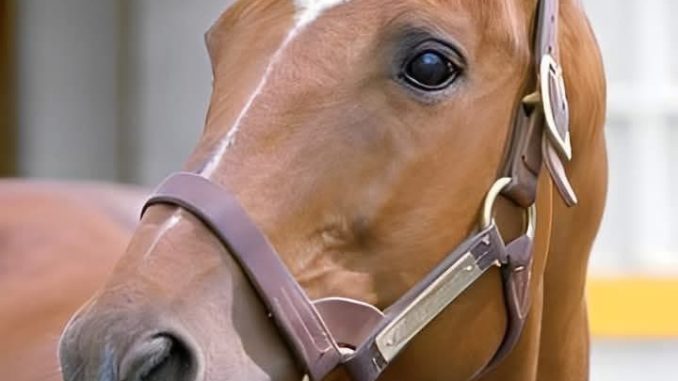
Belmont Park, June 9, 1973 — On a sun-drenched afternoon at Belmont Park, the air shimmered with anticipation as Secretariat, the chestnut colt with a copper sheen, prepared to race into history. With jockey Ron Turcotte poised above him, the two formed an unspoken bond that transcended mere competition — a pact forged in countless early mornings and quiet moments before the roar of the crowd.
That day, it mattered more than ever.
The scene was set for Secretariat’s defining moment: the final jewel of the Triple Crown, the grueling 1½-mile Belmont Stakes. For weeks, horse racing fans had watched the colt’s extraordinary rise, but no one could predict the sheer magnitude of what was to come.
As the starting gate flew open, Ron Turcotte felt the familiar surge beneath him. Secretariat exploded forward with the precision and power of a champion born to fly. Within three strides, the colt found his rhythm, his breath steady and ears pricked. By the time they reached the backstretch, Turcotte’s calm gaze scanned the field. Sham, the closest rival, clung stubbornly to Secretariat’s shadow but showed no signs of overtaking him.
Approaching the half-mile pole, Turcotte eased the reins, giving Secretariat room to stretch out. The colt responded instantly, lengthening his stride to cover an astonishing 25 feet with each bound. The pounding of his hooves echoed like distant thunder, a relentless cadence driving him forward.
At this point, Turcotte’s urging ceased. Instead, he settled into the power beneath him, feeling the wild yet controlled force of Big Red’s charge. It was a moment of pure harmony between horse and rider — no words, just the language of trust and instinct.
As Secretariat rounded the far turn and entered the stretch, the grandstand erupted into a deafening roar. Turcotte glanced over his left shoulder. There was no competition — only the empty daylight behind them. For a fleeting second, disbelief flashed through his mind: they were alone in the lead, dominating one of the greatest races in horse racing history.
Lowering his hands, Turcotte let the reins slip loose, confident that Secretariat would carry them home. The colt’s powerful hindquarters rolled beneath him like a Clydesdale’s, his mane snapping wildly in the wind. The gap widened with each stride — fifteen lengths, twenty lengths, then thirty.
When Secretariat crossed the finish line, he had won by an astounding 31 lengths, a margin that stunned even the most seasoned observers. His time, an unprecedented 2:24 flat for the mile-and-a-half, shattered the previous track record by an astounding 5 seconds.
The victory was more than a record; it was a moment of transcendence. Ron Turcotte eased Big Red into a canter, tears stinging his eyes as the crowd’s roar cascaded over the track like thunder echoing through a cathedral. History hadn’t just been made—it had been obliterated.
In the winner’s circle, Turcotte slid from the saddle and pressed his forehead against Secretariat’s white-blazed face. No words were spoken — just the quiet shared hum of triumph. In that instant, horse and rider became more than athlete and pilot; they were a singular legend, soaring beyond the limits of human or equine achievement.
Secretariat trotted off, still fresh, his tail flicking like a banner of victory. Turcotte watched him go, knowing that such greatness may never come his way again — yet profoundly grateful that he had been part of a day when man and marvel became one, leaving the world breathless and in awe.
The Legacy of a Legend
Secretariat’s Belmont Stakes win remains one of the most iconic moments in sports history, not just for the record-breaking time or staggering margin, but for the spirit of excellence it embodied. The colt’s phenomenal athleticism, combined with Ron Turcotte’s calm mastery and deep connection, created a performance that transcended racing.
Decades later, Secretariat is still celebrated as a symbol of speed, strength, and heart. Ron Turcotte’s quiet demeanor belied his intimate understanding of Secretariat — a bond honed in countless early dawns, where simple moments of trust laid the foundation for greatness.
That June day at Belmont was more than a race; it was a testament to the extraordinary potential of partnership — a reminder that when two beings truly know each other, they can achieve the impossible.
Would you like me to add quotes from witnesses, historical context, or details about Secretariat’s earlier races to make it more comprehensive?
Leave a Reply